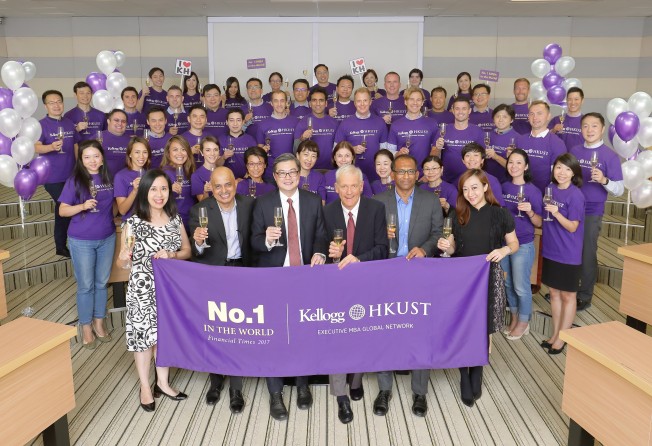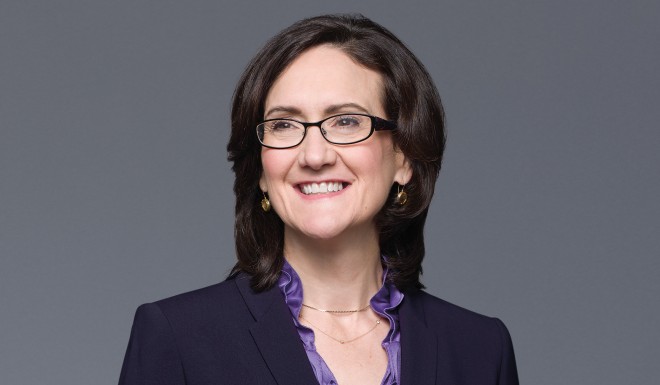
It’s hard work staying on top

[Sponsored Article]
Two schools must keep adapting and enhancing joint executive MBA programme to retain standing as best in business
As the Kellogg-HKUST executive MBA marks its 20th anniversary this month, it is a good time to celebrate successes while planning for the future. The programme, which regularly tops the Financial Times international rankings, built its reputation by offering an evolving combination of specialist knowledge and global expertise.
With classes taught by world-class faculty and eminent guest lecturers, students are inspired to think differently about the process and practice of high-level management and to view key business decisions from a more strategic perspective.
This year’s graduates exemplify those benefits. With an average age of 40 and including 19 nationalities, they represent an array of backgrounds and industries. They are now in a far better position to take on broader responsibilities, effect meaningful change, and contend with new challenges that are bound to emerge in an“age of disruption”. However, to ensure that remains the case for each successive intake, the two schools must keep adapting and enhancing the joint programme. Coverage of essentials such as finance, marketing, effective leadership and value investing must be balanced with discussion of newer topics like blockchain, e-commerce and social media, and their implications for businesses around the world. And respect for corporate ethics, risk management and compliance is embedded at the heart of the curriculum.

“Both schools share the same values and, in terms of academic standing, understand the importance of quality teaching and research,” says Professor Tam Kar-yan, dean of the School of Business and Management at the Hong Kong University of Science and Technology (HKUST Business School). “There is continuous dialogue about improvements and, as members of the Kellogg network, our students can now take courses or electives at seven international campuses including Toronto, Tel Aviv, Miami, Beijing, Evanston, Vallendar and Hong Kong.”
In response to changes and developments, electives have been added on fintech, business analytics, entrepreneurship and family businesses. There is also a move towards more hybrid courses and blended learning, with the planned introduction of recorded videos and an online platform giving students another option for covering the “zero to one” preparatory materials before attending weekend classes. Extra emphasis is placed on the need for the leaders of enterprises in every sector to appreciate the importance of innovation.
“This is something the big companies really have to address within their organisations,” Tam says. “They need to introduce an ‘innovative spirit’ and do more in terms of sustainability and the environment. That’s why we’re gearing up our own capacity in these areas by exploring topics like green finance and engaging more with local community initiatives to create suitable content for the curriculum.”
The basic goal of all EMBA professors, he notes, is to explain the big technology and societal trends in a concise and relevant manner. Executives can then understand the principles and the use of anything from AI and big data to venture capital or supply chains and have “take homes” which they can apply in the workplace straight away.
“In other respects, we are hoping to improve the programme’s gender diversity from the current 70:30 ratio of men to women,” Tam says. “And since most of our students have corporate backgrounds in the commercial world, finance or consulting, we are looking to further provide scholarships, not only for women and entrepreneurs, but also for students from NGOs and emerging markets.”

Professor Sally Blount, dean of the Kellogg School of Management at Northwestern University, confirms that the way businesses operate has changed profoundly since the turn of the century. That makes it essential for management education to keep adapting to meet new norms and expectations.
“The old rules are being rewritten in a world now characterised by reduced barriers to entry, shorter life cycles for products and ideas, and the seemingly endless stream of data and information,” she says. “This results in executives having to solve harder, more complex problems and use new approaches in doing so.”
The combined strengths of the HKUST and Kellogg faculties help EMBA students gain an understanding of current best practices and global leadership challenges. Classroom discussions introduce them to new perspectives and contrasting viewpoints on the issues shaping strategic initiatives, investment priorities, large-scale enterprises and the start-up community.
The programme’s integrated delivery model attracts senior executives from around the world, all ready to share their experience and expertise. It also gives them the chance to take electives at other top business schools and to benefit from the collaboration and exchanges which go with that.
“I have seen first hand the meaningful peer relationships formed across countries, organisations and markets,” Blount says. “We actively encourage this during Global Week in Chicago, a requirement for all students during their first year of study. We also provide every opportunity for students and graduates to engage fully with an alumni network made up of more than 130,000 ‘high impact and low ego’ individuals, which truly spans the globe.”